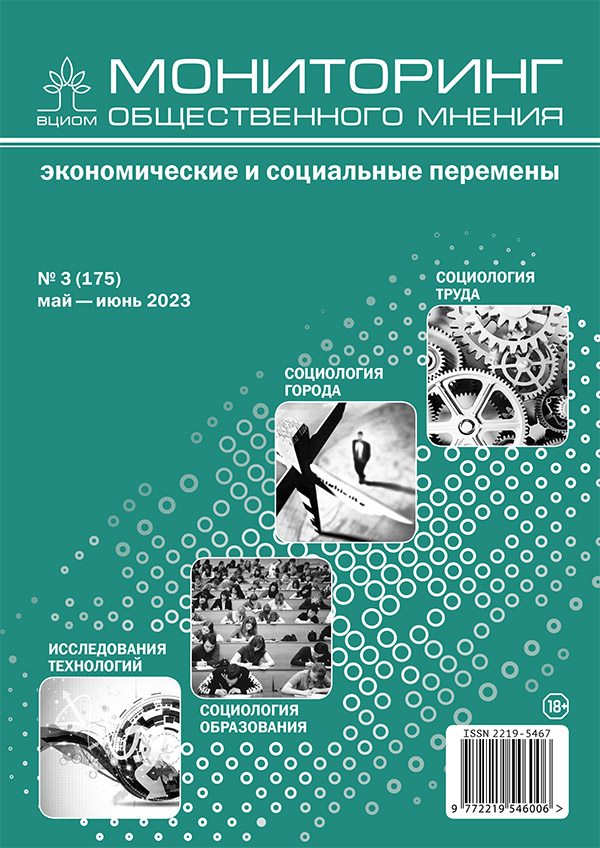Myths and Beliefs about Microchip-Implants in Russia, Ukraine and Slovenia
DOI:
https://doi.org/10.14515/monitoring.2023.3.2122Keywords:
medical microchip, microchip implant, RFID microchip, COVID-19, population mass survey, comparative study, cross-country studyAbstract
The article presents the main results of an international research project on studying the attitudes of the population to new electronic devices — passive RFID microchips (Radio Frequency IDentification, radio frequency identification) implanted into the human body to implement certain functionality. The study examined the level of awareness of RFID microchips, ideas about their potential benefits and associated threats, and the main myths associated with their implementation, including in the context of the COVID-19 pandemic. Data was collected through mass population surveys on a quota sample in three EU countries, Russia and Ukraine. The text compares representations of RFID microchips of residents of three countries — Russia, Ukraine, and Slovenia. It is shown that the awareness of RFID technology is relatively low in all countries, even though in Slovenia, a share of the population who knows about the technology is larger than in Russia and Ukraine. Microchip implants are strongly associated with tracking and control tools. Residents of all three countries believe that tracking digital traces is the least attractive option for using implant microchips in the context of the pandemic, while the identification of vaccinated, recovered, and sick people is assessed positively.
Acknowledgements. The article was prepared within the framework of the HSE University Basic Research Program. We express our deep gratitude to our colleagues from “Aventica” Kirill Nepomnyashchii and Laura Bedredinova for the help with data collection in Russia.
References
Bhuptani M., Moradpour Sh. (2005) RFID Field Guide: Deploying Radio Frequency Identification Systems. Upper Saddle River, NJ: Prentice Hall PTR.
Evanega S., Lynas M., Adams J., Smolenyak K. (2020) Coronavirus Misinformation: Quantifying Sources and Themes in the COVID-19 “Infodemic”. Cornell Alliance for Science Working Paper. URL: https://allianceforscience.org/wp-content/uploads/2020/10/Evanega-et-al-Coronavirus-misinformation-submitted_07_23_20.pdf (accessed: 29.05.2023).
Hu T., Wang S., Luo W., Zhang M., Huang X., Yan Y., Liu R., Ly K., Kacker V., She B., Li Z. (2021) Revealing Public Opinion towards COVID-19 Vaccines with Twitter Data in the United States: A Spatiotemporal Perspective. Journal of Medical Internet Research. Vol. 23. No. 9. Art. e30854. https://doi.org/10.2196/30854.
Hudson J., Caplanova A., Novak M. (2015) Public Attitudes to GM Foods. The Balancing of Risks and Gains. Appetite. Vol. 92. P. 303—313. https://doi.org/10.1016/j.appet.2015.05.031.
Kim S., Choi S.-O., Wang J. (2014) Individual Perception vs. Structural Context: Searching for Multilevel Determinants of Social Acceptance of New Science and Technology Across 34 Countries. Science and Public Policy. Vol. 41. No. 1. P. 44—57. http://dx.doi.org/10.1093/scipol/sct032.
Werber B., Žnidaršič A. (2015) The Use of Subcutaneous RFID Microchip in Health Care — A Willingness to Challenge. Health and Technology. Vol. 5. No. 1. P. 57—65. https://doi.org/10.1007/S12553-015-0105-3.
Werber B., Baggia A., Žnidaršič A. (2017) Behaviour Intentions to Use RFID Subcutaneous Microchips: A Cross-Sectional Slovenian Perspective. In: Pucihar A., Kljajić Borštnar M., Kittl C., Ravesteijn P., Clarke R., Bons R. (eds.) Digital Transormation — Form Connecting Things to Transforming Our Lives: (Conference Proceedings) / 30th Bled eConference, (June 18—21, 2017, Bled, Slovenia). Maribor: University of Maribor Press. P. 669—684. https://doi.org/10.18690/978-961-286-043-1.47.
Werber B., Baggia A., Žnidaršič A. (2018) Factors Affecting the Intentions to Use RFID Subcutaneous Microchip Implants for Healthcare Purposes. Organizacija. Vol. 51. No. 2. P. 121—133. https://doi.org/10.2478/orga-2018-0010.
Žnidaršič A., Baggia A., Pavlíček A., Fischer J., Rostański M, Werber B. (2021) Are we Ready to Use Microchip Implants? An International Cross-sectional Study. Organizacija. Vol. 54. No. 4. P. 275—292. https://doi.org/10.2478/orga-2021-0019.
Downloads
Published
How to Cite
Issue
Section
License
Copyright (c) 2023 Monitoring of Public Opinion: Economic and Social Changes Journal (Public Opinion Monitoring) ISSN 2219-5467

This work is licensed under a Creative Commons Attribution-NonCommercial-ShareAlike 4.0 International License.






